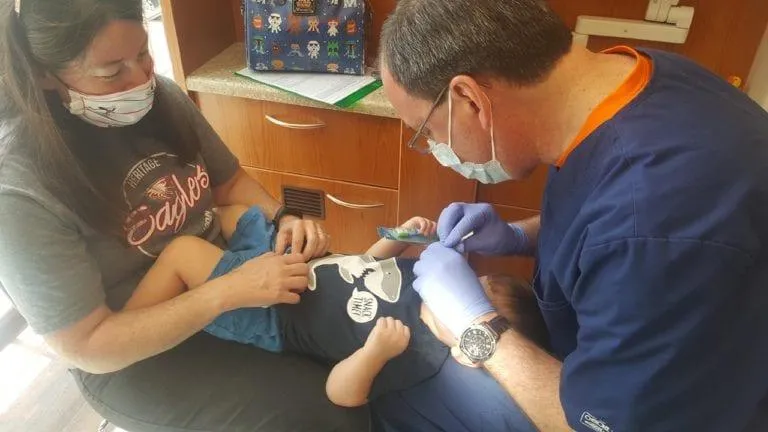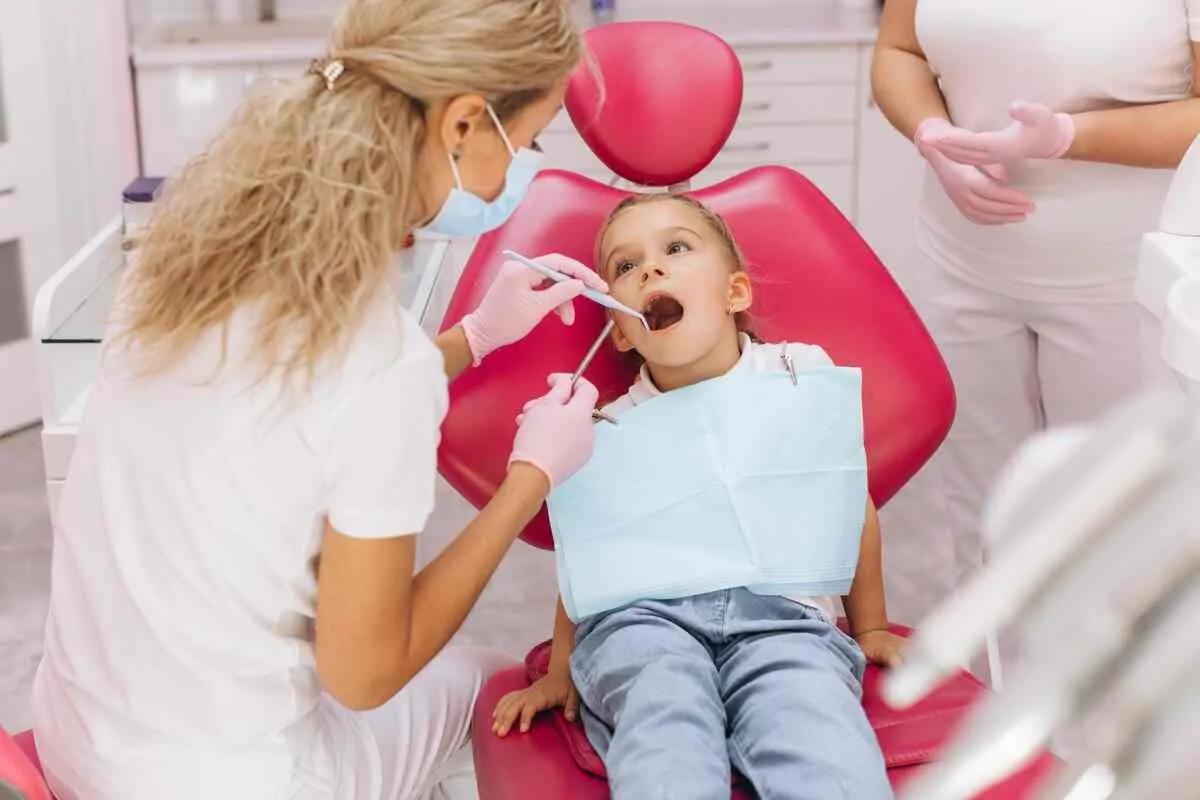WELCOME TO
HURST PEDIATRIC DENTISTRY!
Here at the pediatric dental office of Dr. Joby Hurst, we take pride in offering our young patients the highest quality of dental care in a kid-friendly environment. We are conveniently located in Birmingham, Alabama and are experienced in providing routine dental care for infants, children, teens and patients with special needs.
Dr. Hurst and his team of friendly professionals work together to provide a positive dental experience that will make your child smile! We promise to work with you and your child personally and create a customized treatment plan to meet your individual needs and desires.
Office tour
Early Dental Care
We believe early dental care can promote a lifetime of healthy smiles for your child. We offer a full range of services from routine dental exams and cleanings to fillings, sealants and fluoride treatments that will help ensure that your child grows up with a healthy smile.
Sedation Dentistry
We recognize that for some of our patients, a visit to the dentist makes them a bit nervous.
We offer nitrous oxide sedation for our more apprehensive patients, so they can relax while receiving the dental care that they need.
For those requiring more intensive treatment, Dr. Hurst offers in office anesthesia using Dr. Jeff Plagenhoef.
Dr. Jeff is a board-certified pediatric anesthesiologist with Pediatric Dental Anesthesia Associates.
We appreciate your interest in our practice and encourage you to continue exploring our website to learn more about us. Feel free to contact us to schedule an appointment with Dr. Joby Hurst today!

Blogs and Resources

5 Common Pediatric Dental Procedures
Understanding Pediatric Dentistry
Pediatric dentistry is a specialized branch of dentistry that focuses on the oral health of children from infancy through adolescence. Pediatric dentists have the training and experience to provide a variety of dental services to children, including preventive care, restorative care, and orthodontic care.
Pediatric dentists offer a range of services that not only treat existing problems but also help prevent future ones. From the moment your child’s first tooth appears, a pediatric dentist becomes a crucial partner in your child’s health journey, ensuring their smile stays bright and healthy throughout their young lives and into adulthood.
Common Pediatric Dental Procedures
Here are five of the most common pediatric dental procedures:
1. Dental Fillings
Dental fillings are used to repair teeth that have been damaged by decay or injury. When a tooth is affected by cavities or trauma, a filling restores its normal function and appearance, helping to prevent further decay or damage.
Fillings can be made of a variety of materials, including silver amalgam, composite resin, and glass ionomer cement. Each material has its benefits, and the choice often depends on the location of the tooth, the extent of the damage, and the patient’s needs.
Pediatric dentists typically use composite resin fillings for children because they are tooth-colored and can be matched to the natural color of the child's teeth, making them virtually invisible. This is especially important for fillings in visible areas, such as the front teeth, where aesthetics are a concern.
Composite resin fillings are also less likely to cause allergic reactions than silver amalgam fillings, which contain mercury. In addition, composite resin bonds directly to the tooth structure, providing additional support and requiring less removal of healthy tooth tissue compared to other types of fillings.
To place a filling, the pediatric dentist will first numb the affected tooth using a local anesthetic, ensuring that the procedure is comfortable and pain-free for the child. Depending on the child’s age and anxiety level, the dentist may also use sedation techniques to help them relax during the procedure.
Then, they will remove the decayed or damaged portion of the tooth using a dental drill or laser. The dentist will carefully clean the area to eliminate any bacteria or debris, which is crucial for preventing further decay under the filling.
After the tooth is prepared, they will place the filling material in the tooth and shape it to match the surrounding teeth, ensuring that the filling fits seamlessly with the bite and does not interfere with chewing. The filling material is then hardened, typically using a special curing light, to create a durable and long-lasting repair.
Your child can then walk out of the office with their smile restored and ready to enjoy their favorite foods again.

2. Dental Cleanings
Dental cleanings, also known as prophylaxis, are preventive dental procedures that remove plaque and tartar from the teeth. Plaque is a sticky film of bacteria that can form on the teeth and cause tooth decay and gum disease. When plaque isn’t regularly removed through brushing and flossing, it can harden into tartar, a calcified substance that adheres to the teeth and can only be removed by a dental professional using specialized tools. Tartar buildup can lead to more severe oral health issues, including gingivitis and periodontitis if left untreated.
Pediatric dentists recommend that children have their teeth cleaned twice a year, just like adults. During a dental cleaning, the pediatric hygienist will use a variety of tools to remove plaque and tartar from the teeth including those hard-to-reach spots that might get missed during daily brushing. They may also floss your child’s teeth and apply a fluoride treatment.
Fluoride is a mineral that helps to strengthen the tooth enamel and prevent tooth decay. It works by remineralizing the enamel, which is the outer protective layer of the teeth, making it more resistant to acid attacks from plaque bacteria and sugars in the mouth. This protective effect is especially important for children, whose teeth are still developing and are more vulnerable to decay.
Fluoride treatments can be applied in a variety of ways, including gels, varnishes, and rinses. These treatments are quick, painless, and highly effective. Gels are often applied using a mouth tray that the child bites into for a few minutes, allowing the fluoride to coat all surfaces of the teeth. Varnishes are painted directly onto the teeth with a small brush, where they quickly harden, providing a concentrated dose of fluoride that continues to protect the teeth for several hours. Rinses are swished around the mouth, reaching areas that might be missed by brushing alone.
In addition to in-office treatments, fluoride can also be found in many types of toothpaste and even in community water supplies, offering ongoing protection against tooth decay. Regular fluoride treatments, combined with good oral hygiene practices, are a key component in maintaining strong, healthy teeth throughout childhood and beyond.
These regular dental cleanings are essential in maintaining good oral hygiene and preventing cavities, especially since children may not always brush and floss as thoroughly as needed. Regular dental visits also allow the dentist to monitor the development of your child’s teeth and gums, catching potential issues early before they become serious problems. For example, early detection of cavities or signs of gum disease can result in simpler, less invasive treatments.
Think of it as giving your child’s teeth a fresh start every six months. The process is usually quick and painless, and many children even find it fun to see their teeth shine afterward.

3. Dental Crowns
Dental crowns are caps that are placed over teeth to protect them from further damage. Crowns can be made of a variety of materials, including porcelain, metal, and zirconia. These materials are chosen for their durability and ability to mimic the natural appearance of teeth, ensuring that your child’s smile remains both functional and aesthetically pleasing.
Pediatric dentists may recommend dental crowns for children who have teeth that are severely decayed, damaged, or misshapen. Crowns are particularly useful when a tooth is so compromised that a simple filling wouldn’t provide sufficient protection. By covering the entire tooth, a crown can restore the tooth’s shape, size, and strength, allowing your child to chew, speak, and smile with confidence.
Crowns can also be used to protect teeth that have had root canals. After a root canal, a tooth can become more brittle and prone to fractures. A crown helps to shield the tooth from these potential issues, ensuring that it remains intact for years to come. Crowns can be especially important for saving a tooth the might otherwise need to be extracted, preserving the tooth’s function and appearance.
To place a crown, the pediatric dentist will first prepare the tooth by removing any decayed or damaged portion of the tooth. This step is crucial as it ensures that the tooth beneath the crown is healthy and free of infection. Once the tooth is properly prepared, the dentist will take an impression of the tooth so that the crown can be custom-made. This impression captures the exact shape and size of the tooth, allowing the crown to fit perfectly.
Once the metal, zirconia, or porcelain dental crown is ready, the pediatric dentist will cement it onto the tooth.

4. Root Canals
A root canal is a procedure that is used to treat a tooth that has become infected. The infection can be caused by bacteria that enter the tooth through a cavity, crack, or chip.
If the infection is not treated, it can spread to the surrounding bone and tissue and lead to an abscess. An abscess is a painful collection of pus that can cause swelling and drainage.
To perform a root canal, the pediatric dentist will first numb the affected tooth. Then, they will make a small opening in the tooth and remove the infected pulp. The pulp is the soft tissue inside the tooth that contains the nerves and blood vessels.
Once the pulp has been removed, the pediatric dentist will clean and disinfect the inside of the tooth. A temporary root canal filling may be placed. Then, they will later fill the tooth with a material called gutta-percha, which according to Colgate, is a plastic substance from a Malaysian tree called a Gutta-percha tree used as a permanent filling in root canals. Finally, they will seal the tooth with a crown or filling.
5. Dental Sealants
Dental sealants are thin, plastic coatings that are applied to the chewing surfaces of the back teeth. Sealants act as a barrier to protect the teeth from plaque and food particles.
Pediatric dentists typically recommend sealants for children as soon as their permanent molars erupt. Sealants can help to prevent cavities in the back teeth, which are the most susceptible to decay.
To apply sealants, the pediatric dentist will first clean and dry the teeth. Then, they will paint the sealant onto the chewing surfaces of the teeth. The sealant will harden within a few minutes.

Benefits of Pediatric Dental Care
Regular pediatric dental care is like giving your child’s smile a solid foundation to grow on. Beyond just keeping teeth clean, consistent dental visits help to set your child up for a lifetime of good oral health.
Regular pediatric dental care is important for a number of reasons. It can help to:
Prevent tooth decay and gum disease
Identify and treat dental problems early
Help children develop good oral hygiene habits
Improve children's overall health and well-being
When kids see the dentist regularly, small problems like tiny cavities can be caught before they become big issues, saving your child from pain and you from unexpected expenses.
Pediatric dental care also plays a role in overall health. Oral health is closely linked to the health of the entire body. For example, gum disease, which can be caught early with regular dental visits, has been linked to heart health.
The Connection Between Gum Disease and Heart Health
You might be surprised to learn that the health of your child’s mouth can affect their entire body, including their heart. Gum disease, also known as periodontal disease, occurs when the tissues surrounding the teeth become infected due to bacteria buildup. If left untreated, this infection can spread beyond the mouth and lead to inflammation throughout the body.
Research has shown that inflammation caused by gum disease is not just confined to the mouth—it can have a ripple effect on overall health. In particular, it has been linked to an increased risk of heart disease, one of the leading causes of illness worldwide. The bacteria from inflamed gums can enter the bloodstream, potentially leading to the formation of plaque in the arteries—a condition known as atherosclerosis. This plaque can restrict blood flow and increase the risk of heart attack or stroke, even in young individuals.
For children, catching gum disease early through regular dental visits can significantly reduce these risks. By ensuring that their gums stay healthy, you’re not just protecting their teeth—you’re also contributing to their long-term cardiovascular health. Early intervention is key, as it prevents minor gum issues from escalating into more severe conditions that could impact their overall well-being later in life.

Good Dental Habits for Children
Starting good dental habits early can help your child avoid many common dental issues in the future. Here are some habits to encourage:
Brushing Twice a Day: Teach your child to brush their teeth for two minutes in the morning and before bed. You can make it fun by using a timer or playing their favorite song.
Flossing Daily: Once your child’s teeth start touching, it’s time to introduce flossing. Flossing helps remove food particles and plaque from between the teeth, where a toothbrush can’t reach.
Limiting Sugary Snacks and Drinks: While it’s okay to enjoy sweets occasionally, too much sugar can lead to cavities. Encourage your child to drink water and choose healthier snacks like fruits and vegetables.
Using Fluoride Toothpaste: Fluoride helps strengthen tooth enamel, making it more resistant to decay. Make sure your child uses fluoride toothpaste, and ask your dentist if fluoride treatments are recommended.
By helping your child establish these habits early, you’re setting them up for a future of strong, healthy teeth.

Tips for Choosing a Pediatric Dentist
Choosing the right pediatric dentist can feel like a big decision, but it’s worth taking the time to find someone who makes both you and your child feel comfortable.
When choosing a pediatric dentist for your child, there are a few things to keep in mind:
Look for a dentist who has experience working with children.
Ask about the dentist's training and qualifications.
Make sure the dentist's office is child-friendly and welcoming.
Talk to your child's doctor for recommendations.
Start by looking for a dentist who has specialized training in pediatric dentistry. This means they’ve gone through additional years of schooling to understand the unique needs of children’s dental care. They know how to handle everything from a squirmy toddler to a nervous teenager with the right balance of patience and expertise.
Consider the experience of other parents when making your choice. Ask friends, family, or your child’s doctor for recommendations. Word of mouth can often lead you to a great dentist who might not be on your radar otherwise.
The environment of the dental office is another important factor. Look for a child-friendly setting with colorful decorations, toys, and a welcoming atmosphere. A friendly and approachable staff can make a world of difference in how your child perceives their dental visits.
Conclusion
Pediatric dental care is important for children of all ages. By taking your child to the dentist for regular checkups and cleanings, many of the more common dental procedures may become unnecessary.
If your child needs dental services, call us for an appointment at (205) 969-7454. Dr. Joby Hurst is happy to help with your child’s dental care.

19 INVERNESS CENTER PARKWAY, STE 250, BIRMINGHAM, AL 35242
TEL: 205.969.7454
E-MAIL: [email protected]
2018 © ALL RIGHTS RESERVED | PRIVACY POLICY | TERMS AND CONDITIONS
Site by Trustway Marketing Powered by Kyrios Systems